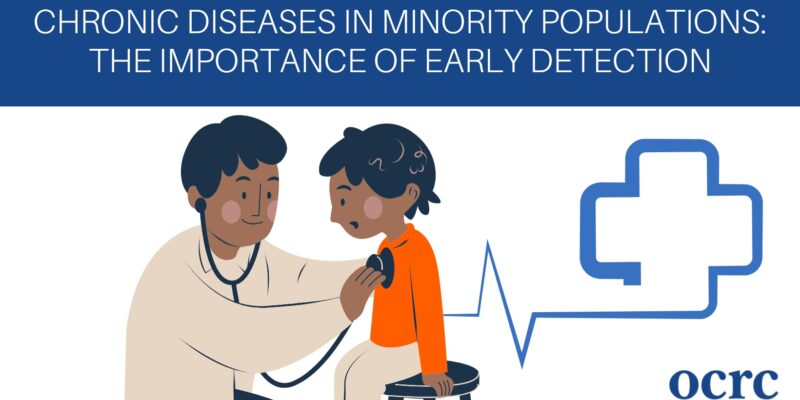
Chronic diseases like diabetes, heart disease, asthma, and certain types of cancers disproportionately impact minority populations. Black, indigenous, and people of color (BIPOC) populations are up to two times more likely than white people to suffer from the majority of chronic illnesses. Yet, their access to preventive care is much lower.
This disparity not only puts a significant financial strain on minority populations but also impacts their quality of life and increases the burden on the overall healthcare system. Early detection is an essential tool in addressing these issues and creating better treatment outcomes.
Another way to improve treatment outcomes is to encourage BIPOC individuals to participate in clinical trials, which can advance medical research and help illuminate the factors that contribute to chronic disease prevalence in minority populations.
It’s a consistent issue that minority populations are underrepresented in clinical trials of all types. There are several reasons for this, including a lack of trust in the medical community as a result of historical discrimination.
The historical mistreatment of minority populations left deep scars in these communities that often makes members hesitant to participate in trials. This hesitancy has led to misinformation as to what clinical trials are, which has only made the problem worse.
Another problem that could prevent minority populations from participating is finances. Taking part in a trial could mean needing to travel, arrange childcare, and pay for other types of expenses that could get in the way.
Aside from worsening the already existing healthcare disparities, a lack of diversity in clinical trials can mean biased results. This could result in treatments that may only offer the stated outcomes to certain demographics without the benefits of comprehensive clinical research.
The more diversity there is in clinical trials, the better the treatment’s effectiveness and safety will be for everyone. Not being able to see how treatments for chronic illnesses impact minorities can also slow innovation, since scientists won’t be faced with the variety of health and genetic differences they need to account for in their research.
Without BIPOC representation, health disparities continue to worsen because of the high number of these conditions in minority communities, putting more burden on clinics and emergency rooms.
Aside from being able to help improve medical options, having diverse clinical trials helps in the detection of diseases. Scientists will have a better understanding of the factors that make these communities more prone to chronic illnesses, which can make it easier to test for them.
The faster that illnesses are detected, the easier they are to treat, leading to better outcomes for everyone and encouraging trust in the scientific process.
To encourage more BIPOC individuals to participate in clinical trials, each issue that is preventing them from joining needs to be addressed. Community engagement must occur. BIPOC individuals will be more likely to participate if a trusted leader encourages them to do so.
It’s also necessary to demonstrate just how the results of clinical trials can help the community at large. Community education on what clinical trials are and how the safety barriers in place prevent the repetition of past issues is essential.
It’s also necessary to address transportation and financial issues. Offering stipends and providing housing for the duration of the patients’ participation could be a good way of getting more people to consider joining in.
Some communities might not even know that clinical trials are taking place because the information doesn’t reach them via the normal recruitment channels. Alternative communication channels, including reaching out to the community in their own language, can boost participation, too.
At Orlando Clinical Research Center, we know just how essential diversity is in all fields, but especially when dealing with medicine. Minority communities have consistently had the highest percentages of chronic illnesses, and it’s time to find effective ways of preventing and treating those diseases.
Orlando Clinical Research Center is dedicated to working closely with pharmaceutical and biotech companies to evaluate the safety and efficacy of innovative drugs and treatments. Our state-of-the-art facilities welcome people of all backgrounds to participate in the current studies we’re hosting. Contact us to learn more about how you can help improve healthcare for everyone.
